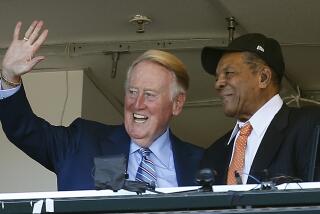PASSINGS: Frank Pulli, William Froug, Soledad Mexia
Frank Pulli
MLB umpire turned to instant replay in ’99
Frank Pulli, 78, a longtime umpire for Major League Baseball who used instant replay to make a call nearly a decade before video reviews were allowed, died Wednesday in Palm Harbor, Fla., of complications from Parkinson’s disease, according to MLB.
Pulli umpired in the National League from 1972 to ’99 and worked four World Series, six NL championship series and two All-Star games.
FOR THE RECORD:
Frank Pulli: In the Sept. 2 LATExtra section, a brief obituary of Major League Baseball umpire Frank Pulli said that Pulli ruled on a play during a 1978 World Series game between the Dodgers and New York Yankees in which a ball thrown by second baseman Davey Lopes glanced off baserunner Reggie Jackson’s leg. It was shortstop Bill Russell, not Lopes, who made the throw, and the ball hit Jackson’s hip, not his leg. —
Early in the 1999 season, Cliff Floyd of the Florida Marlins hit a drive against St. Louis that was originally ruled a double. Fredi Gonzalez, the Marlins’ interim manager, argued. Pulli, the crew chief, changed it to a home run.
That drew a beef from the Cardinals, so Pulli decided to check replays on a TV camera near the Marlins’ dugout. The game in Miami was delayed for more than five minutes before Pulli overturned his own call and put Floyd back at second base.
At the time, the Marlins filed a protest that was denied by NL President Len Coleman. But Coleman also said Pulli was incorrect to use replay.
After the game, Pulli said it was the first time he had used a TV replay to make a call.
“I sure don’t want to make a habit of it,” he said then. “But at that moment, I thought it was the proper thing to do.”
In 2008, MLB approved the use of replay on potential home runs.
Pulli was part of another noted play during Game 4 of the 1978 World Series between the Dodgers and New York Yankees. The Dodgers tried to turn an inning-ending double play in the sixth inning, but a relay throw by second baseman Davey Lopes glanced off Reggie Jackson’s leg.
A run scored and Dodgers Manager Tom Lasorda argued that Jackson should have been out for interference. Pulli was officiating at first base and allowed the play to stand. The Yankees won in 10 innings and wrapped up the title in six games.
Pulli also was the first base umpire when Hank Aaron hit his 715th home run and broke Babe Ruth’s record.
A native of Easton, Pa., Pulli was among the 22 umpires who lost their jobs in a failed mass resignation in 1999. He was an umpire supervisor for MLB from 2000-07.
William Froug
Writer-producer on popular ‘60s TV shows
William Froug, 91, a writer and producer who worked on some of the hallmark TV shows of the 1960s, died Aug. 25 at a hospice facility in Sarasota, Fla., of gastrointestinal bleeding, said his daughter, Lisa Froug-Hirano. Among the shows he produced were “Twilight Zone,” “Gilligan’s Island,” “Bewitched” and “Adventures in Paradise.”
He received a 1959 Emmy for his work on “Alcoa-Goodyear Theatre,” according to the Academy of Television Arts & Sciences.
FOR THE RECORD:
An earlier version of this article said William Froug died Aug. 23. He died Aug. 25. It also said he died at his home. He died at a hospice facility. Additionally, the article said Froug won an Emmy for his work on the “Bewitched” series. He was nominated for his work on that show.
In addition to Froug’s work in TV, he was known for writing several books about the profession, including “Zen and the Art of Screenwriting” and “How I Escaped From Gilligan’s Island and Other Misadventures of a Hollywood Writer-Producer.”
Film critic Roger Ebert was a fan of the books and in a 2007 pan of the movie “The Man in the Chair,” Ebert suggested that the filmmakers should read Froug’s “brilliant and useful books about screenwriting and teleplays.”
William Froug was born in New York City on May 26, 1922, and was adopted as a baby by William and Rita Froug of Little Rock, Ark., where he grew up. He received a journalism degree from the University of Missouri and served in the Navy on a submarine chaser during World War II. Upon his discharge in Los Angeles, Froug sold his first story to True Detective magazine, and with the help of a college friend working at CBS he was hired to write scripts for radio shows.
Froug rose through the ranks to produce prestigious programs. His proudest achievement was writing and producing shows for the oft-described “experimental” CBS Radio Workshop that debuted in 1956 with his adaptation of Aldous Huxley’s “Brave New World,” with Huxley as narrator.
With radio drama dying, Froug segued into television. Froug produced the last season of the original “Twilight Zone” in 1964 but mostly left producing behind after his “Bewitched” stint to write his books and teach screenwriting at UCLA.
Soledad Mexia
California’s oldest resident was 114
Soledad Mexia, who had been California’s oldest resident, died Friday in a Chula Vista hospice, only 17 days after celebrating her 114th birthday, according to Dr. Stephen Coles of the Gerontology Research Group at UCLA.
Mexia was born Aug. 13, 1899, in Mexico but moved to the United States when she was very young and became an American citizen, Coles said.
The daughter of a Sinaloan carpenter, Mexia was a homemaker most of her life.
The Gerontology Research Group is an organization of physicians, scientists and engineers who validate supercentenarians, people 110 or older.
The world’s oldest person, Misao Okawa of Japan, is 115, Coles said.
-- Los Angeles Times staff and wire reports
More to Read
Start your day right
Sign up for Essential California for the L.A. Times biggest news, features and recommendations in your inbox six days a week.
You may occasionally receive promotional content from the Los Angeles Times.






